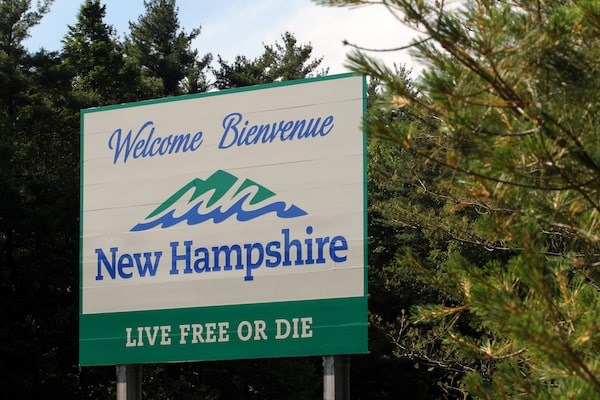
Bilingual sign at the New Hampshire border with Massachusetts on Interstate 95.Bill Manning/iStockPhoto / Getty Images
David Shribman is the former executive editor of the Pittsburgh Post-Gazette and winner of the Pulitzer Prize for coverage of U.S. politics. He teaches at McGill University’s Max Bell School of Public Policy in Montreal
The scenic cruises on the Finestkind I, the 45-year old wooden vessel built 160 kilometres north of here, are gearing up. The clams are being steamed at Barnacle Billy’s, the restaurant on picturesque Perkins Cove where Bill Clinton and George H. W. Bush burnished their postpresidential friendship. The tubs of ice cream have been unloaded at the Scoop Deck, where giant cones are consumed among giant mosquitoes. And yet everywhere in this beach town there is the sense of something missing.
Canadians.
For decades, visitors from beyond the border have flocked here and across northern New England, browsing antique shops, lingering at coffee shops, wandering into art galleries. Over in New Hampshire they have clambered through the White Mountains, and in Vermont they have compared the cheeses with the offerings back home.
Not last year. Not this year, so far.
Canadian flags still fly from businesses along Route 1 between Ogunquit and Kennebunkport. A fading Bienvenue, Québécois sticker (complete with l’accent aigu, a rarity in these parts) still sits on the storefront at International Mountain Equipment outlet in North Conway, N.H., where visitors can satisfy all their crampon needs. And though there are no Ontario plates in the parking lot, the welcome mat is still out at the designer-outlet stores in Manchester, Vt.
Canadian visitors have been so much a part of a New England summer that Kathie Coté, the third-generation owner of Polly’s Pancake Parlor in Sugar Hill, N.H., the other day leaned over a plate groaning with cornmeal hot cakes infused with coconut and said, “We used to be able to tell when the Canadian holidays were by the crowds we got.”
But this spring, all of northern New England is singing the line of a 1989 Janet Jackson song, hoping for a reprise of the flood of visitors from up north to New England’s own eastern townships: “Come back to me/I’m beggin’ you please.”
Some of this yearning is for Canadian dollars, to be sure. Two years ago, 5.4 million Canadian visitors spent nearly US$1.2-billion here in Maine alone and accounted for one-fifth of all tourist retail expenditures. One in seven overnight visitors in the state was from Canada.
But it is more than the money. In an age where trade tensions, tariff threats and Trump tweets disrupted the comity of America’s governmental relationship with its northern neighbour, friendship ties never frayed. Families like mine share cross-boundary heritages; I owe my entire existence to Canadian visits. My Massachusetts father met my Montreal mother at a New England beach in 1949. They were married in Quebec two years later.
“Everybody is noticing the absence of the Canadians,” former Democratic representative Barney Frank, who moved to Ogunquit with his husband, Jim Ready, after concluding a third of a century in Congress, told me. “Canadians add to the cultural flavor of Ogunquit. No one around here is hearing the word ‘minister’ and wondering whether the person is talking about a political official or a parson. And we’re not hearing any French on the beach.”
Indeed, one of my fondest childhood memories was walking along vast expanses of Ogunquit Beach and hearing radios blaring accounts of how an Expos frappeur d’urgence hit a ground ball to the l’arrêt-court. Somehow a Red Sox pinch hitter’s ground ball to the shortstop lacked a certain elegance.
It may break with every American stereotype about Canada, but people here prize their neighbours for the sizzle they bring to the summertime proceedings. Northern New Englanders believe Canadians possess an intoxicating mix of the exotic and the familiar.
“The season loses something when there aren’t Canadians in Maine,” said Jason Opal, an American historian who taught in Maine before joining the McGill University faculty. “There’s not a lot of cultural diversity in a state that is pretty homogenous. And life can be pretty glum in a place where the paper mills are closed and all those jobs are gone. It’s really true that Canadians liven things up.”
So down here — and across Down East, the easternmost area of Maine that abuts the Maritime Provinces and is part of historical Acadia — Americans for decades have employed a phrase also popular in Canada, one that is captured in a popular Broadway show: We liked summer visitors who would come from away.
One who came from away for more than three decades was former prime minister Brian Mulroney, who was a frequent guest of Mr. Bush in Kennebunkport, a 19-kilometre drive up the road from Ogunquit. In the senior Mr. Bush’s first summer as president, he invited Mr. Mulroney, his wife and four children to Walker’s Point to ″show off this heaven″ that his family built on Maine’s rocky shore 119 years ago. Between manic trips on the president’s cigarette boat and casual visits to Mabel’s Lobster Claw down the street, the two leaders engaged in leisurely conversations about trade and the drug crisis in Colombia.
“I loved going to Maine, seeing those wonderful views, going fishing twice a day, taking long walks with huge concentrations of Secret Service agents,” Mr. Mulroney said in an interview. “It was one of the great perks of friendship and of office.”
Nine days before the terrorist attacks of Sept. 11, 2001, when Mr. Bush’s son was in the White House, the former prime minister and the former president shared a classic Maine moment. Mr. Bush took Mr. Mulroney to the side of the house, the weathered exterior that fronts the ocean, and there, almost unobtrusively, was a small plaque with the letters C-A-V-U. Mr. Bush — who was so eager to join the Second World War that he considered joining the Royal Air Force in Canada and at 19 probably was the U.S. Navy’s youngest aviator — explained that during the war he and his fellow pilots yearned to hear the phrase “ceiling and visibility unlimited.”
It was Maine’s C-A-V-U that attracted so many Canadians here, and they returned the favour by enriching the residents of Maine — and reminding them of their shared heritage in the New France colony of Acadia in the 17th and 18th centuries.
“The sense of historical Acadia — of being connected to Canada — is something that many of us like to celebrate,” said Patrice Franko, an economist who directs the Global Studies Program at Colby College in Waterville, Me., which is closer to St. Stephen, N.B., than to Boston. “North American tribes crossed borders. We share histories. The logging industry was not confined to one of our countries. We share a sense of what it means to be in this climate. In a way, that border was not a border, because for centuries people didn’t know where one country started and another ended.”
But with his caustic remarks about Prime Minister Justin Trudeau and his citation of national-security factors in defence of his trade policies, Donald Trump reinforced a separation that was inconsistent with the region’s history and geography — and then COVID created a border wall that was never built physically but that nonetheless kept the two countries apart.
It was an unnatural separation.
Many years ago Jacques Parizeau, the separatist premier of Quebec, told me that Francophones felt more comfortable in New England than in Ontario. Far be it from me to compare the charms of Maine and Mississauga, but an organization called Bienvenue au New Hampshire affiliated with the state’s Department of Economic Development has been encouraging merchants to develop “Canadian/Québécois cultural programming that is specifically designed to strengthen the North Country economy” and that includes fostering an “increased understanding of basic French-language words and phrases among front-line service workers.”
To encourage tourists from the rest of Canada to venture south, Ryan Prescott, whose comic versions of Maine’s distinctive accent have been broadcast across the state, has assembled a guide to teach what he calls “summah visitahs” some helpful English-language tips. But one thing the natives won’t be saying is the old tourist trope: “Come on in, the water’s warm.”
Last weekend the National Weather Service outpost in Portland, Me., sent out a bulletin warning that the 31-degree temperatures should not cause people “to underestimate the dangers of the cold water” because a dip in Maine’s Sebago Lake or New Hampshire’s Lake Winnipesaukee “can quickly cause hypothermia to anyone immersed in the water.”
Just another reason you’ll feel right at home once the border is open.
Keep your Opinions sharp and informed. Get the Opinion newsletter. Sign up today.
 David Shribman
David Shribman